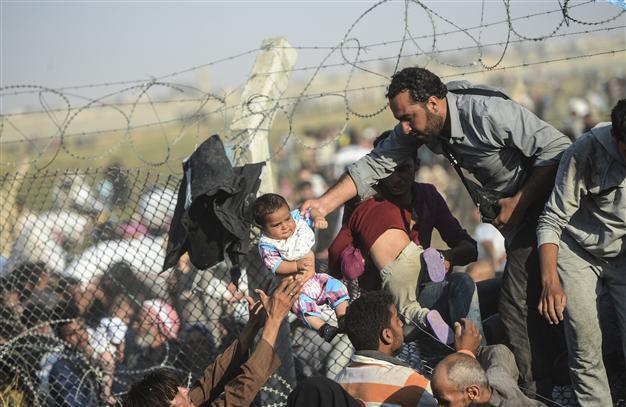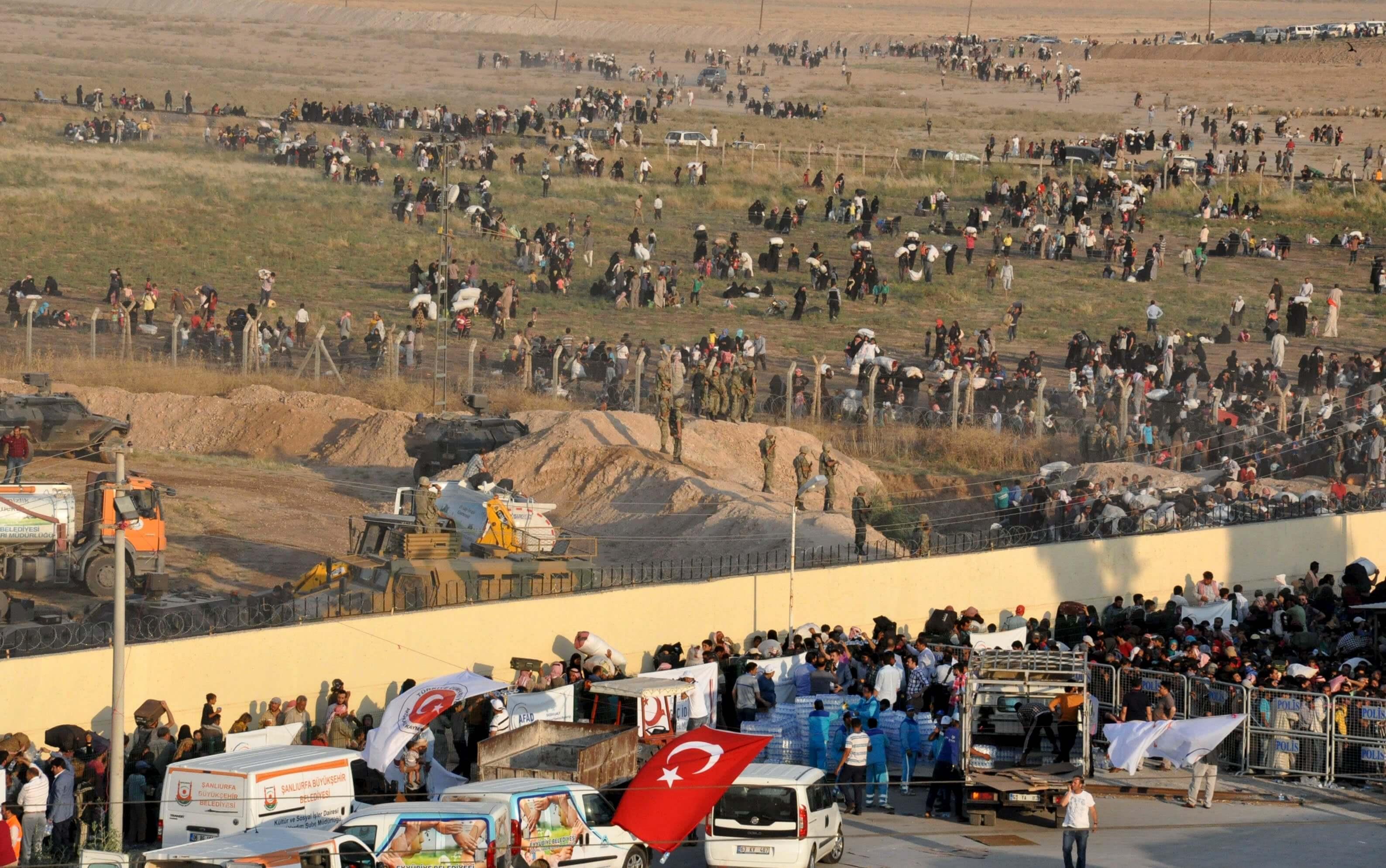Syrian border crisis on cabinet agenda
ANKARA / ŞANLIURFA

Syrians fleeing the war pass through broken border fences and trenches to enter Turkish territory illegally, near the Turkish border crossing at Akcakale in Sanliurfa province on June 14, 2015. AFP Photo
Thousands of people have poured over Syria’s border to Turkey, fleeing a battle between Kurdish forces and the Islamic State of Iraq and the Levant (ISIL) near the border town of Tal Abyad, prompting close attention from Turkey’s cabinet.Turkish authorities closed the border on June 14 after allowing in at least 3,000 people, as thousands of others remained stranded, with many spending the night outside the frontier fences.
Dozens of Syrian refugees poured into Turkey on June 15 after Ankara reopened the border. Some 400 Syrians had initially been given permission to enter Turkey June 15 through the Akçakale border crossing in the southeastern province of Şanlıurfa, with some 1,000 clustered behind barbed wire, AFP reported.
Forces from the Kurdish People’s Defense Units (YPG) and the Women’s Defense Forces (YPJ) backed by Syrian rebels advanced on the southeastern edge of Tal Abyad, also known as Gire Spi, on June 14, as U.S.-led strikes against ISIL fighters continued.
Syrian Kurdish forces cut June 15 a vital supply road linking the flashpoint border town of Tal Abyad to ISIL’s bastion of Raqqa, a Kurdish commander told AFP.
“The Kurdish People’s Protection Units have cut the route” leading south out of Tal Abyad, which lies on the Syrian-Turkish border, said commander Hussein Khojer.
Last week, approximately 16,000 people fled to Turkey to escape the fighting, but the border has been closed sporadically, with Ankara saying it would only allow refugees into the country in the event of a humanitarian tragedy.
“If Turkey accepts a new wave of refugees from Tal Abyad, it means that Turkey should be prepared for an influx of at least 100,000 refugees,” Deputy Prime Minister Numan Kurtulmuş said June 14.
“We are of the opinion that there isn’t a humanitarian crisis in Tal Abyad, similar to Kobane or other regions in Syria. Therefore, we want to make humanitarian aid on the border,” he told private CNNTürk television.
There was speculation the decision to close the border on and off for thousands of Syrians and then open crossings to let them take shelter in Turkey was due to Ankara’s concerns over the YPG’s advance into Tal Abyad, which would finally link two of Rojava’s cantons, Kobane and Jazira.
President Recep Tayyip Erdoğan earlier said he was troubled by the advance of Kurdish forces to Tal Abyad, saying they could in the future threaten Turkey. Erdoğan has previously said he saw no difference between the radical Islamists of ISIL and the secularist Democratic Union Party (PYD), the political wing of the YPG/YPJ.
The president alleged that ethnic Arabs and Turkmens were being targeted in the advance.
He said the places refugees had vacated were being occupied by the PYD and the outlawed Kurdistan Workers’ Party (PKK).
“This is not a good sign,” he said. “This could lead to the creation of a structure that threatens our borders.”
A written statement by some 15 Syrian groups also said Tel Abyad residents were leaving homes to escape a “cleansing by the PYD.”
Turkey, along with its Western allies, considers the PKK to be a terrorist group. Ankara also accuses the PYD of being the Syrian wing of the PKK.
Erdoğan has repeatedly expressed concern about the West’s backing for Kurdish forces in Syria, saying it could lead to PKK domination of northern Syria.
However, he U.S. Embassy to Ankara said on its Twitter account on June 15 that ISIl was the cause of the increase in refugees.
“Coalition airstrikes in northern Syria have targeted and destroyed ISIL units and worked hard to avoid civilian casualties,” it said.
“Civilian outflows from Tal Al-Abyad are the result of people fleeing fighting brought about by ISIL. Contrary to insinuations from some in the media, the coalition works hard to ensure civilians are not hit in airstrikes,” it said.

Syrian refugees from Tel Abyad (foreground) line up at the bordercrossing as the others wait behind the fences to cross into Turkey at the Akcakale border gate in Sanliurfa province, Turkey, June 14, 2015. Reuters Photo
















